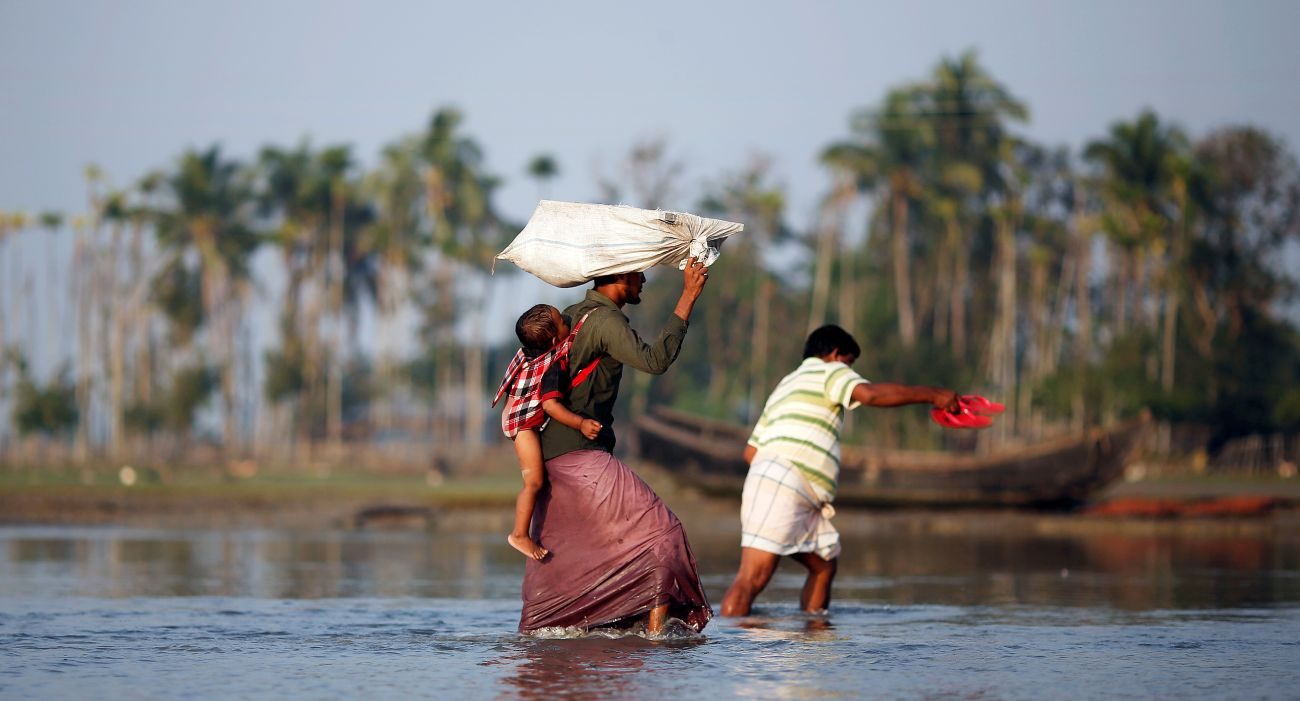VATICAN CITY (CNS) — While the ongoing crisis of Rohingya refugees fleeing Myanmar for Bangladesh will draw much attention during Pope Francis’ visit to the two countries in late November, the pope also is expected to focus on interreligious dialogue, poverty and climate change.
“He will be insisting on economic justice and environmental justice,” said Cardinal Charles Bo of Yangon, Myanmar. Justice in both areas would be “the major promoters of peace and harmony” in the region.
Although to different degrees, the two countries the pope will visit are struggling to establish a democracy that respects the rights of minorities — both religious and ethnic. Differences are exacerbated by poverty and the difficulty of accessing very limited resources; the situation is further worsened by climate change, which is evident in the droughts, flooding and increased power and frequency of cyclones that move in from the Bay of Bengal.
[hotblock]
Both Bangladesh and Myanmar are ranked in the top 10 on the “Long-Term Climate Risk Index” published annually by Germanwatch think tank.
Pope Francis is scheduled to arrive in Myanmar Nov. 27 and stay until the afternoon of Nov. 30 when he flies to Bangladesh. He returns to Rome late Dec. 2.
Although lively and growing, the Catholic communities in both countries make up less than 1 percent of the population. The vast majority of people in Myanmar are Buddhist, while the overwhelming majority in Bangladesh are Muslim. Both countries have been plagued by political and ethnic tensions that have found religion to be an easy difference to exploit for political gain.
In Bangladesh, Pope Francis will ordain 16 priests; in 1986, St. John Paul II visited the country and ordained 18 men to the priesthood. One of the 18 is now Bishop Paul Ponen Kubi of Mymensingh.
“The Bangladesh church has grown a lot,” Bishop Kubi told Catholic News Service. “We had only four dioceses and four bishops in Bangladesh; now we have eight dioceses and nine bishops.”
“We are a very small minority Christian community in Bangladesh,” the bishop said, but all the people want “to live together in harmony and peace, though they are of many religions and cultures. I believe that Holy Father Pope Francis will emphasize this.”
“We are in the periphery,” he said, but Pope Francis’ presence “will make us known to the whole world. We feel proud of his coming.”
[tower]
Cardinal Bo told CNS that he expects interreligious initiatives for peace to be a major theme of the pope’s talks in Myanmar where, like in other countries, religions can “become the tools for extremism. The pope’s presence and his dialogue with various stakeholders would affirm the reconciling role of religions in this country.”
The theme of the visit to Myanmar is “Love and Peace.” And, similarly, the theme of the visit to Bangladesh is “Harmony and Peace.”
Both Myanmar and Bangladesh have experienced tensions between religious communities and have mourned the loss of lives slaughtered in terrorist attacks. The Muslim faith of the Rohingya is cited as one of the reasons they often are seen as “foreigners” by Buddhist nationalists in Myanmar. Bangladesh, too, has had experience of hardline nationalists, this time Muslims, attacking members of its Hindu minority.
In both countries, the Catholic community has been a force for dialogue.
Cardinal Patrick D’Rozario of Dhaka, Bangladesh, told CNS that interreligious dialogue “is not imported by us, it is part of our culture.”
“The Catholic Church is very active in a dialogue of service,” he said, with non-Catholics accounting for 90 percent of those receiving medical care, education or development aid from the church. Only about 30 percent of the staffers are Catholic, but the entire staff discusses the human and religious values they have in common.
Also, he said, people in Bangladesh — from the president and prime minister on down — make a point to participate in each other’s major feasts. So dialogue “is not just a cerebral discussion, but a celebration.”
“The Christian community is considered a peace-living community in Bangladesh,” he said.
In Myanmar, Cardinal Bo said, the church is “a small but very visible community,” which has “an opportunity to be salt and light to this nation.”
“We are in the forefront of interreligious initiatives for peace,” he said, pointing out that Catholics organized the country’s first interreligious peace conference.
“We have raised our voice for the protection of democracy, we support democratic forces,” he said. “Democracy is in a very early stage, and it needs support.”
The core of Pope Francis’ message is likely to be similar to the heart of his message in Sri Lanka in January 2015: “The inability to reconcile differences and disagreements, whether old or new, has given rise to ethnic and religious tensions, frequently accompanied by outbreaks of violence.”
Religions have a key role to play, he insisted. But that means “all members of society must work together; all must have a voice. All must be free to express their concerns, their needs, their aspirations and their fears. Most importantly, they must be prepared to accept one another, to respect legitimate diversities and learn to live as one family.”
PREVIOUS: ‘Papal’ Lamborghini gift to be auctioned off for charity
NEXT: Australian archbishop: New marriage law must include conscience clauses




Share this story